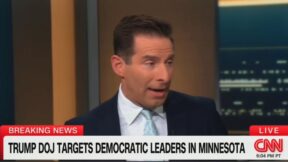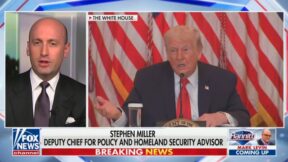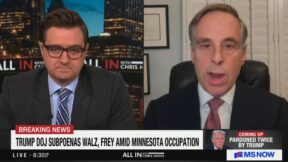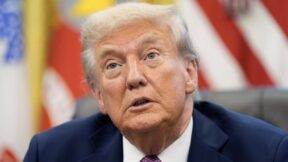Judges Smacking Down Trump Immunity Say Trump Himself ‘Conceded’ Key Points In Blistering Ruling
Three judges wrote in a blistering appeals court decision denying former President Donald Trump’s claim that Trump and his legal team conceded several key points that helped knock down his arguments.
Four weeks ago, at a stunning appeals court hearing, Trump’s attorney argued that a president could order SEAL Team Six to assassinate a political rival and not face prosecution unless he were impeached and convicted first.
On Tuesday, the appeals court finally made its ruling. In a 57-page opinion, the three-judge panel unanimously decided no, presidents can’t legally order assassinations.
The opinion was signed by all three judges on the panel: Judge J. Michelle Childs, who was nominated by President Joe Biden in January 2022 and confirmed in July 2022; Judge Florence Pan, nominated by Biden in May 2022 and confirmed in September 2022; and Judge Karen LeCraft Henderson, who was appointed by then-President George H.W. Bush in 1990.
Legal analysts were stunned by the force of the opinion — the word “eviscerating” was bandied about — but Trump’s own legal team lent a major assist in defeating the ex-president’s claim of “ABSOLUTE IMMUNITY.”
In one section, the judges wrote that Trump’s argument about needing immunity for things “THAT CROSS THE LINE” so as to avoid a “chilling effect” was defeated by his other argument that he could only be prosecuted for assassinating a rival if he were convicted in an impeachment hearing:
[P]ast Presidents have understood themselves to be subject to impeachment and criminal liability, at least under certain circumstances, so the possibility of chilling executive action is already in effect. Even former President Trump concedes that criminal prosecution of a former President is expressly authorized by the Impeachment Judgment Clause after impeachment and conviction. E.g., Oral Arg. Tr. 13:25– 14:9. We presume that every President is aware of the Impeachment Judgment Clause and knows that he is “liable and subject to Indictment, Trial, Judgment and Punishment, according to Law,” at least after impeachment and conviction.
And in another section, the judges write that Trump made another important concession with that argument — that even alleged “official” acts like sending Navy SEALs to assassinate people you haven’t been impeached and convicted for murdering are still prosecutable:
Former President Trump also implicitly concedes that there is no absolute bar to prosecuting assertedly “official” actions. He argues elsewhere in his brief that his impeachment on the charge of inciting insurrection was based on conduct that was the “same and closely related” to the “official acts” charged in the Indictment. Appellant’s Br. 46 (“President Trump was impeached and acquitted by the Senate for the same and closely related conduct to that alleged in the indictment.” (emphasis omitted)); id. at 42 (“[A]ll five types of conduct alleged in the indictment constitute official acts.”). And he agrees that if he had been convicted by the Senate in that impeachment trial, he would not be immune from prosecution for the “official acts” at issue here. See id. at 31. Thus, he concedes that a President can be prosecuted for broadly defined “official acts,” such as the ones alleged in the Indictment, under some circumstances, i.e., following an impeachment conviction.
Yet another passage, on Trump’s assertion of “double jeopardy principles,” reads an awful lot like a roast:
[W]ell-established law interpreting the Double Jeopardy Clause undermines rather than supports former President Trump’s argument that he may not be prosecuted. Perhaps recognizing that normal double-jeopardy rules disfavor his position, he claims that the Impeachment Judgment Clause incorporates “double jeopardy principles” that are distinct from the Double Jeopardy Clause. See Appellant’s Br. 54 n.7. But if the “double jeopardy principles” he invokes are unmoored from the Double Jeopardy Clause, we are unable to discern what the principles are or how to apply them. He thus fails to establish that his Senate acquittal bars his criminal prosecution.
Read the full opinion here. and watch Trump’s argument above.





Comments
↓ Scroll down for comments ↓